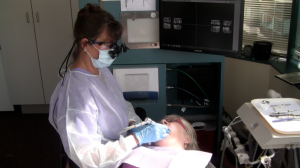
Regularly brushing your teeth is an important part of dental health, but you should be careful not to overdo it. Photo: Dr. Stephen Ostwald, DDS (2014)
Most people are aware of the critical importance of dental hygiene, but what isn’t so well-known is the danger of overdoing it. While routine brushing and flossing are crucial for maintaining dental health, brushing too vigorously and too often can actually harm your teeth and gums.
Whether you brush too fast, too hard or too often, over-brushing can lead to several adverse effects, including enamel abrasion, which is when a tooth’s protective enamel layer breaks down. Sugary and acidic foods and drinks tend to be the primary culprits of enamel abrasion, but it can also be caused by excessively harsh and frequent brushing. Another common symptom of over-brushing is gum recession, where the gum tissue actually pulls away or “recedes,” gradually exposing the tooth’s sensitive root area. Both enamel abrasion and gum recession can increase your risk of developing periodontal disease and cavities.
While such symptoms often result from improper brushing technique, another factor to consider is the type of toothbrush you use. Some people think a toothbrush with hard bristles will provide a better cleaning, but a soft-bristled model is often a better choice, especially if you’re prone to vigorous brushing. Another common misconception is that an electric toothbrush will take the guesswork out of brushing your teeth. The reality is that researchers have found little significant difference in the results of using either style.
If you’re experiencing symptoms like enamel abrasion or gum recession, it might be time to re-examine some of your dental hygiene habits. Dental professionals recommend brushing at least twice a day, so brushing in excess of three times a day may be excessive. Also, make sure you’re using proper technique and applying the appropriate amount of pressure when you brush. If you’re unsure about the effectiveness of your brushing habits, consult a dental professional.
To find a Diamond Certified dentist in your area, click on one of the links below.
Alameda County: www.diamondcertified.info/alameda-dentists
Contra Costa County: www.diamondcertified.info/contra-costa-dentists
Marin County: www.diamondcertified.info/marin-dentists
San Francisco: www.diamondcertified.info/san-francisco-dentists
Santa Clara County: www.diamondcertified.info/santa-clara-dentists
Solano County: www.diamondcertified.info/solano-dentists
Sonoma County: www.diamondcertified.info/sonoma-dentists
